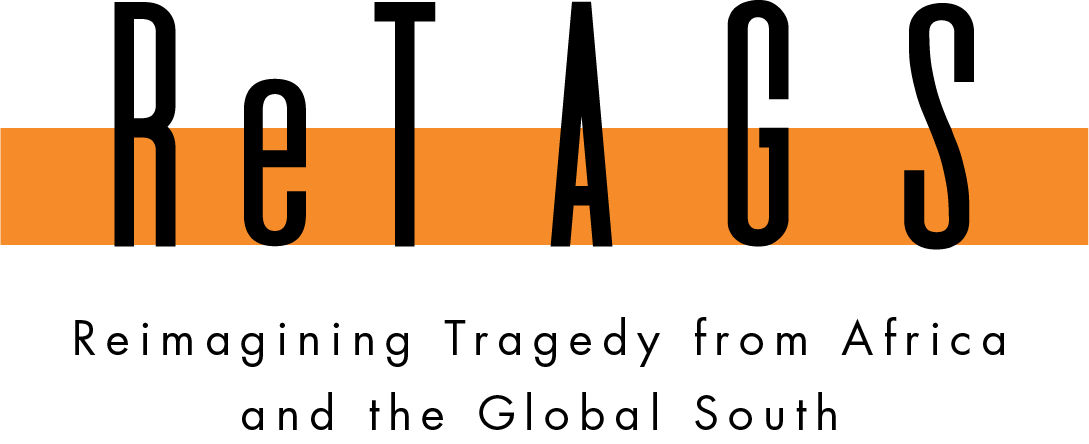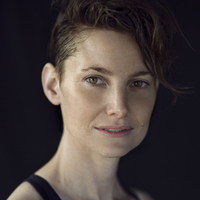Oral history interview with Habibat Muhammed
Title
Interviewee
Interviewer
Date Created
Recorded At
Duration
Capturer
Transcriber
Keywords
Language
Rights
Audio-Type
Habibat Muhammed
Olalekan Balogun
RETAGS
Saturday 12 October 2019
Transcribed by Jayne Batzofin
Balogun Okay, so hello, can we meet you?
Muhammed Yes my name is Muhammed Habibat Oshoke
Balogun Okay.
Muhammed Yes. I'm an actor, I'm a model too...
Balogun Okay.
Muhammed … and I dance.
Balogun Wow. So Habibat, let's look at it like this… You've acted in a number of plays, mostly tragedies.
Muhammed Yes.
Balogun How do you describe tragedies from your experience of the plays that you have done?
Muhammed Okay, from my experience, I describe tragedy as an unpleasant event, something terrible. Like I can also see it as, it could be a state of mind that is being portrayed.
Balogun mmm.
Muhammed Yes.
Balogun Can you elaborate on that, because that really sounds interesting?
Muhammed Yes.
Balogun Tragedy being a state of mind-
Muhammed -a state of mind, yes. Because I say tragedy as a state of mind in a sense that what is tragic to me might be funny to someone else. So when one state of mind is portrayed I see it as tragedy, especially when it's unpleasant.
Balogun So you think most of the time we see a tragedy onstage, it's possible for us to imagine that that drama is actually portraying the character's state of mind.
Muhammed Exactly. What is being portrayed is actually what was probably conceived in the mind of someone that is being put to life onstage. That is how I see it.
Balogun mmm. Now how do you relate this tragedy that is dramatized onstage to the one that happens in everyday life?
Muhammed Okay, how come it relates tragedy onstage to… Well I feel it's actually natural as human beings we've all had various experiences and these experiences actually can relate to one another. One experience can relate somehow to another experience. So these experiences that are portrayed onstage somehow have a way of linking other experiences in the society. If you bring in these plays, like Once upon an Elephant, I acted in Once upon an Elephant. It's a story, event that we see almost every day, in our everyday lives in our environment and all. Where the actions of one comes back to him somehow. Maybe through his own child or somehow, something relating to him anyway.
Balogun Now let's talk about your involvement in that tragedy, Once upon an Elephant. Umm, that's an adaptation, it's an adaptation of… of a… traditional folktale by the writer, Bosede Ademilua-Afolayan.
Muhammed Yes.
Balogun And you played one of the lead roles, you played Demoke. The woman who is unfortunate to- I mean-
Muhammed I played the Desola.
Balogun - you played Desola, Demoke's daughter. Desola was unfortunate to have fallen victim to-
Muhammed Yes.
Balogun - to Ijedodo ritual which he aims to use to turn himself into some kind of immortal God. Now how did you prepare for that role, I mean in terms of psychological readiness…
Muhammed Yes.
Balogun … to play that character that was almost killed in the play?
Muhammed Well it was, I don't want to say it was quite challenging, but I will just use the word- it was a bit challenging because I haven't been in such situations. So trying to put myself in that situation, you know, it took me some kind of research, asking questions, yeah, and watching more Yoruba movies because I really don't know much about the Yoruba culture. I'm not Yoruba.
Balogun Apart from that, was there any particular incident that you were trying to connect to in order to be able to … bring the psychological…
Muhammed Yes, this I tried to connect to was the… umm… the part of when she was really sick, you know, and that ritual aspects where she had to fight, more like fight for her life back. So that's… umm… you know I've been really really sick once, so I had to bring myself back into that state.
Balogun mmm. So how did you do that?
Muhammed Well… as an actor- actually the way you rehearse it is not the way it will come out on performance. I feel there is this kind of, maybe, I don't want to call it some kind of spirits or something, that just comes in onstage when you know you have the lights complete, you have the music and everything. So it just takes you to another world entirely. So from the past experiences I know everything just comes back like a flash and then you become a different person onstage. Yes. I remember the ritual scene, where I carried the calabash, you know,-that ritualistic dance and all that. I can't really- if you tell me to perform the way I did onstage it won't be exactly the way I performed it because there was something different. You know, the other things added to it: the lights, the sound, the costume and that stage, you know, the stage as a different world is quite different from the normal… the normal… So as an actor I put in a lot of work and performance was fine. It was something else.
Balogun So, umm, like this thing you are saying, so what specific things actually help you to be able to, you know, play the role of the tragic character that you are given? I'm not talking about the role. I'm talking about some aspect of the directorial approach and some staging choices. What particularly was, can you say was really effective in putting you in the mood?
Muhammed Well… umm… there are various scenes anyway and most of the time I wasn't alone, you know. There was another character Odekunle who was supposed to be the man I was supposed to get married to. So it was more like character back-up. So with his own… I acted with two of them, that was… umm… Busayo and Adeola. So, you know, they were actually very very good. So their own renditions add a way of helping my own acting, yes. Because it's everyday life when a girl talks to the man she wants to marry, you know these things come naturally. Yes, especially probably when you've been in a relationship once and, you know… So that's… the chemistry came in somehow, somehow because we've actually been in some situations like that. So we just bring it back onto stage and looks really…
Balogun Okay, so you try to connect to-
Muhammed Exactly.
Balogun - particular experiences in your own private life-
Muhammed Yes.
Balogun - that are happening.
Muhammed Exactly.
Balogun Now, what was the process of putting the play onstage like, I mean the rehearsals and all of this?
Muhammed The rehearsals umm, the rehearsal was, it was fantastic rehearsal a bit tedious too but… At least we made a lot of progress and you know, it's not just everyday rehearsals, personal work too. Because whatever you rehearse if you don't keep- if you don't work personally on your own, it won't be so good. So aside from rehearsals to personal work. So you can't really say it was just putting together the rehearsals that brought the performance to life, so you can also add the personal work done.
Balogun So now, would you say the kind of tragedy that was dramatised is related to the one that you experienced in everyday life or was it different in anyway to what you staged?
Muhammed Well, I won't say like personal life but we can relate it to, to everybody's, like the environment.
Balogun That's what I mean that when I say, you know, personal life-
Muhammed Okay personal life-
Balogun - I'm talking about-
Muhammed - the society-
Balogun - everyday society-
Muhammed - yes everyday society.
Balogun Yes.
Muhammed Yes, yes because…
Balogun In what specific ways are you… ?
Muhammed Okay I would like to… I will specify from the play itself.
Balogun Yeah please maybe a particular instance in the play you can actually connect to a particular instance in everyday life.
Muhammed Okay yes, for instance where Serubawon… you know, from the start. He was actually the problem of the whole play. So we see that in, you know out of greed, yes especially greed and, you know, just wickedness any way. Yes wickedness, and then everything now comes back, you know him trying to make his son immortal and the whole process comes back to him where it affects his daughter. So we see these things every day. Okay, even in the process where it affects his daughter incest was committed, we can see it because Desola and Ajanaku are siblings.
Balogun mmm.
Muhammed Not from the same mother but they are siblings. And we see that every day, you know, incest, siblings, sleeping with each other – it happens, consciously and unconsciously. So these things they are actually a form of a mirror in the society somehow with these plays. And it's really tragic.
Balogun So, if you look at that the tragic situation that was dramatised as close to us as the tragic situations that we live through our lives and all of those things that we do.
Muhammed How do you-
Balogun Like the tragic elements in the play as close to us as a kind of tragic situation that we also live with and experience-
Muhammed Exactly. Yes. Totally
Balogun Okay, thank you so very much Habibat.
Muhammed Thank you sir.
Balogun turns off the audio recorder





